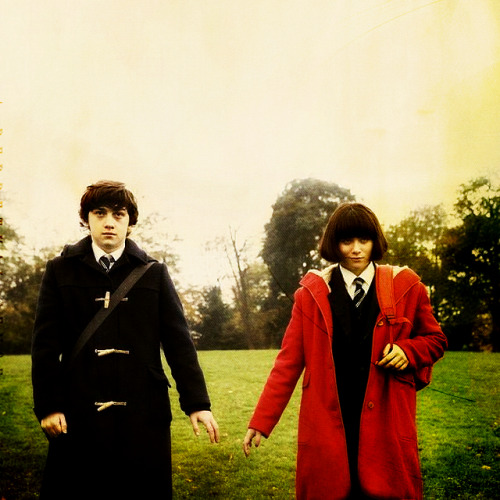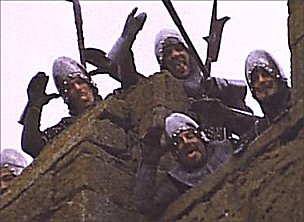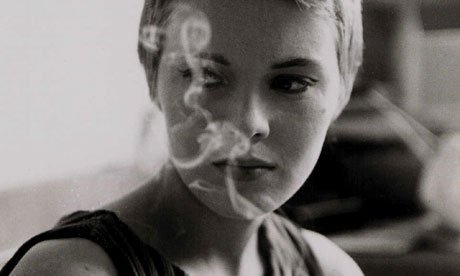As a teenager, we all secretly wish we were French.
The relationship between Britain and France is largely based on stereotypes. The French - wearing berets and onion/garlic necklaces whilst smoking and looking like a pretentious dick, and the British - drunken football fanatics who like to glass you in the face or charming Hugh Grant types who like to get glassed in the face. Either way, there has always been an underlying PLAYFUL (not racist) hatred.
Much like these guys really.
However, there are qualities from each nationality that are endearing. The French provide that certain ‘je ne c’est quoi’ that makes the films they make impossibly chic and stylish and the British are masters of awkward comedy and social drama, where you end up giggling like a school girl whilst writhing in your seat in embarrassment - as though your parents have just walked in on you masturbating - followed by a brief cry at the social injustices that befall the characters. It’s these two qualities that are merged together by Submarine that make it very different from the average British film.
Oliver Tate is coming of age and trying to find out who he is. Yet more importantly, he’s trying to get his leg over. Enter Jordana, a girl who is completely alien and yet so familiar. Throw into the mix the fact that he’s trying to save his parents marriage as well and you’ve got a pretty standard set up for a very British film.
But here is where the film cracks out the snails and dons the beret. The film itself is very French in the way it has been constructed. The playfulness of the French New Wave is infused in every sequence, yet the films director, Richard Ayoade (better known as Moss from TV’s The IT Crowd), owns the style in a more controlled manner as to avoid the anti-narrative tangents that the 60s film movement often divulged into. Montages of romance are interspliced with awkward family conversations and ridiculous slapstick, teenage humour with some rather disjointed interactions that can so easily cause a film to become thinly spread and schizophrenic - thankfully, this is not the case.
This is what could have happened...
This technique of filming is intrinsically linked to the fact the story is entirely told from Oliver’s point of view. Based on a novel that speaks entirely in the first person, the films construct becomes the visual representation of the internal thoughts he has. A line of voiceover (a regular occurrence in the film) sums it all up - “I often wish there was a film crew following my every move. Someone making a documentary about a prominent thinker who struggled with unspeakable loss.” The visual style of the film is how he imagines this documentary would be, and this calls into question just how British Oliver really is. If he is British, why does the film as told from his perspective remind me so much of the French New Wave?
This brings me back to the opening statement about teenagers wanting to be French. The most relatable part of the film, what makes it so charming, is the sheer pretentious arrogance that possesses Oliver. It is an arrogance that we have all embraced at some point in our lives around his tender age of 15. We’ve gone through phases, we’ve tried to be like our role models, we’ve tried to get laid, ALL of us have at one point, been like Oliver in our own way.
Of course I am now implying that the French are pretentious and arrogant. Of course I don’t mean that. For one thing, it helps them have a certain look like this...
"Ooh la la"
...and the image we Brits get across is something like this...
"Hang on Dave, I'll take you to hospital in a minute. I FOUND FLOOR CHIPS!"
So is this film’s rich blend of French and British (what I like to call Fritish) a mere mark of the stereotypical view we have of the French? Or is it just a heavily influenced film that has given a breath of Fresh air to the usual British film? Who cares? It’s a real gem of a film and not to be missed.
Which leads me to another point. Recently, we are seeing British directors coming into their own to make new and innovative films that better the latest Hollywood bank breaking projects. Duncan Jones with Moon, Edgar Wright with Shaun of the Dead, Gareth Edwards with Monsters and one I’m particularly excited about seeing, Joe Cornish with Attack The Block (Released May 13th). All of which have a hand in making some of the newer Hollywood films. We are seeing an uprising of British directors looking to take Hollywood by storm, to turn their tired and formulaic paint by numbers filmmaking into something new and great, to breathe life into a lagging film industry struggling with recession and piracy. I for one, am very excited for what could come around in the next few years.
As the French might say - “Vive la Révolution!”





No comments:
Post a Comment